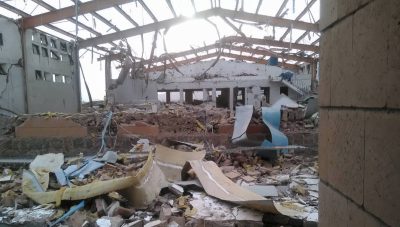Devastating Humanitarian Crisis: Update on the Situation in Hodeidah, Yemen

“I have friends who can’t leave their homes because they don’t have the means to travel. They are scared for their safety. They might be left in the crossfire without any water, food or way to escape.”
Quote from NRC’s Hodeidah Office Coordinator, Saleem Al-Shamiri, in Sana’a:
“Many people fled their homes in Hodeidah already. Sana’a and other cities are receiving many displaced. Water supplies have been cut off in some areas. Even families who refused to leave their house behind, have now been forced to flee because the fighting is closing in. Some of my friends arrived yesterday and today early morning. They are concerned for their future and worried they have lost their homes and income. How will they manage to rebuild their lives again?”
“I have friends who can’t leave their homes because they don’t have the means to travel. They are scared for their safety. They might be left in the crossfire without any water, food or way to escape. I am hoping the warring parties will allow safe routes out of the city as the fighting gets closer. People must be given a chance to save their own lives.”
Latest updates:
- As of Tuesday, fighting began to escalate again. Heavy fighting and airstrikes continue in southern districts of Hodeidah city, and there is a risk that some aid warehouse may become inaccessible, according to the UN.
- Two villages close to Hodeida Airport have been severely affected, and an estimated 1,000 people fleeing into Hodeidah city, and more expected. They are arriving to districts prone to cholera, raising concerns about their ability to access safe water as well as other assistance.
- A major concern is access both for civilians to flee fighting, and for humanitarians to reach Hodeidah with aid. The road from Sana’a is reportedly closed, leaving the only available route through Hajjah; this is currently open, but it is unclear how much longer it will remain so.
- As of 19 June, the water supply has been disrupted in several areas and people are reportedly relying on water from mosque wells. The sheer numbers mean that per capita water consumption is likely to be lower than the minimum necessary; and the risk of contamination remains high. Access to adequate and safe water is now a major concern, particularly in light of the ongoing cholera emergency.
- While vessels continue to berth and discharge at Hodeidah, overall numbers of vessels arriving at the port remain well below those during the same period in the previous two months. In particular, only four to five vessels have been at anchorage awaiting a berth compared to roughly four times as many in the same period in April or May.
Facts:
- Some 29.3 million people live in Yemen, and 3.3 million people live in Hodeidah governorate.
- About 2.7 million people need humanitarian assistance.
- Since 1 June, over 30,000 people have fled their homes in due to the current offensive, according to OCHA.
- Some 162,000 suspected cases of cholera have been identified in Hodeidah since April 2017, equating to 15 per cent of Yemen’s total cholera caseload.

